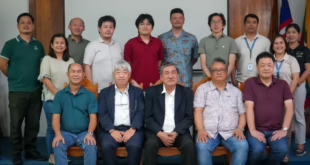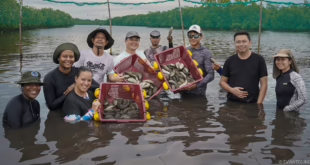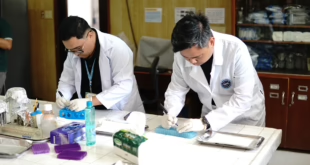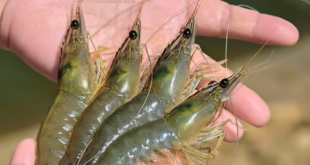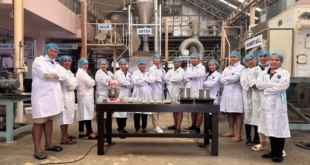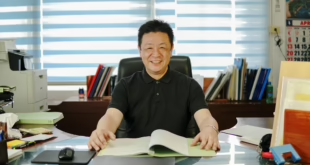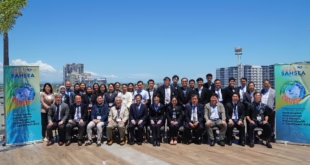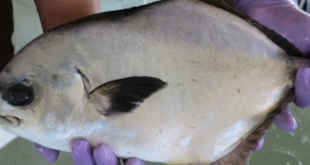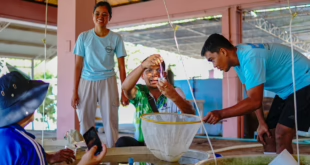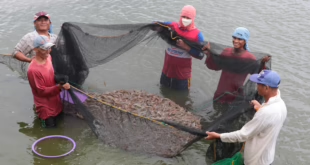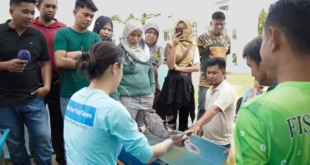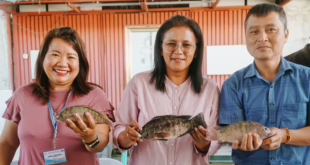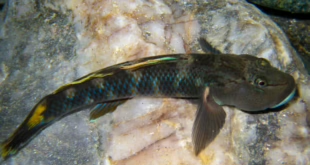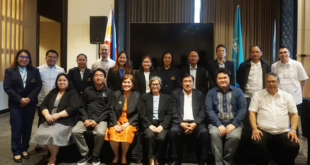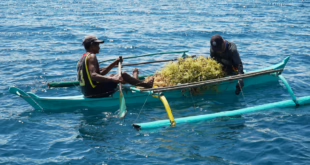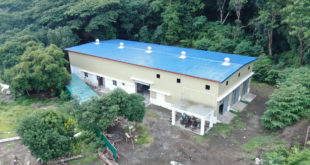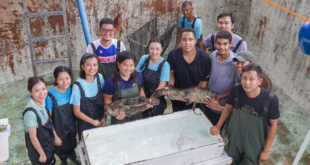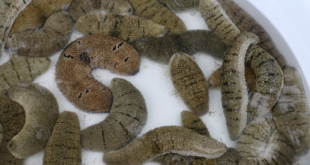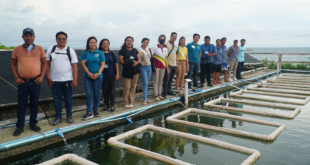Researchers from SEAFDEC/AQD and Japanese experts convened on 5 June 2025 at the Tigbauan Main Station for discussions on the next phase of collaborative research under the Japan International Research Center for Agricultural Sciences (JIRCAS).
Read More »An Amphipod Map: The fully sequenced mitochondrial genome of a freshwater shrimp
SEAFDEC/AQD Associate Scientist Dr. Joana Joy de la Cruz-Huervana and her co-authors considered Gammarus nipponensis as an ideal model organism for studying the impacts of habitat fragmentation and evolutionary diversification on the genes of amphipods.
Read More »SEAFDEC/AQD launches first 2025 sandfish seed production course with trainees from Seychelles and the Philippines
SEAFDEC/AQD ran its first 2025 training course on sandfish (𝘏𝘰𝘭𝘰𝘵𝘩𝘶𝘳𝘪𝘢 𝘴𝘤𝘢𝘣𝘳𝘢) seed production, nursery, and management from 28 April to 13 May 2025.
Read More »Brunei Darussalam strengthens aquatic animal diagnostics through SEAFDEC/AQD training
Brunei Darussalam’s Department of Fisheries (DOF) enrolled two staff in SEADEC/AQD’s customized training course on Aquatic Animal Disease Diagnosis Using PCR from 21 to 25 April 2025 in Iloilo, Philippines.
Read More »Artificial diet boosts reproduction in Indian white shrimp’s broodstock
Dr. Sheryll Santander-Avanceña and her team at SEAFDEC/AQD, in collaboration with the University of the Philippines Visayas, developed a formulated feed for the Indian white shrimp called the “Special Feed for Maturing Penaeus indicus Broodstock,” which was granted a utility model by the Intellectual Property Office of the Philippines.
Read More »BFAR staff gain practical skills in milkfish aquaculture at SEAFDEC
Another batch of personnel from the Bureau of Fisheries and Aquatic Resources (BFAR) trained at SEAFDEC/AQD on milkfish aquaculture from 17 to 28 March 2025 as part of the Philippines’ push to boost local production. The 12-day program gathered 14 personnel from various BFAR offices and facilities, including the Central Office and regional offices from Regions 3 (Central Luzon), 10 (Northern Mindanao), 11 (Davao), 12 (Soccsksargen), and 13 (Caraga). At the opening program, BFAR-3 Regional Director Wilfredo Cruz emphasized the importance of a skilled workforce to support the National Bangus Development Program (NBDP) of the Philippines. “With this training, I hope we can reach our target and make the country self-sufficient in fry production,” he told the trainees. Intensive training …
Read More »Fisheries economist Dr. Takahiro Sajiki joins SEAFDEC/AQD as Deputy Chief
SEAFDEC/AQD, an intergovernmental organization promoting sustainable aquaculture across Southeast Asia, welcomed Dr. Takahiro Sajiki as its new Deputy Chief.
Read More »SEAFDEC/AQD leads international workshop on sustainable aquaculture and aquatic animal health
ILOILO CITY, Philippines – From 12–14 March 2025, government personnel, experts, and researchers from across Southeast Asia convened to tackle key challenges in aquaculture and strengthen regional collaboration.
Read More »Hydrogen Peroxide Baths: controlling sea lice in pompano farms
The commercial production of pompano in the Philippines may not be as big as that of tilapia or milkfish, but it is developing. And with development comes challenges. There are increasing reports of sea lice infecting pompano grown in fish cages.
Read More »Thai fisheries staff train at SEAFDEC/AQD to boost milkfish production
Three fisheries biologists from Thailand’s Department of Fisheries (DOF) enhanced their skills in milkfish aquaculture through a specialized training course at SEAFDEC/AQD held from 3 to 14 March 2025.
Read More »Fighting Deadly Shrimp Diseases: Effectiveness of probiotics and disinfection
A study, led by SEAFDEC/AQD Scientist Dr. Leobert de la Peña, demonstrated the efficacy of probiotics and a disinfectant against two of the deadliest shrimp diseases: acute hepatopancreatic necrosis disease (AHPND) and luminescent vibriosis.
Read More »Bangsamoro eyes grouper farming with SEAFDEC expertise
The Ministry of Agriculture, Fisheries, and Agrarian Reform–Bangsamoro Autonomous Region in Muslim Mindanao (MAFAR-BARMM) has partnered with SEAFDEC/AQD to train its extension workers and local fishers in marine fish farming from 24 to 28 February 2025.
Read More »SEAFDEC/AQD holds freshwater aquaculture training for member countries
Seven participants completed the International Training Course on Community-Based Freshwater Aquaculture for Remote Rural Areas in Southeast Asia, held at SEAFDEC/AQD’s Binangonan Freshwater Station on 13-27 November 2024.
Read More »Does Size Matter? Female Mate Choice in Freshwater Goby
Choosing a mate can be a complicated matter to humans. Many factors such as looks, personality, or status always come into play. For the freshwater goby however, finding a mate seems quite simple for it seems to come down to a matter of size.
Read More »Government collaboration, research infrastructure highlighted at PTAC Meeting
SEAFDEC/AQD’s collaboration with Philippine government agencies and its construction of new research infrastructure took the spotlight during the 31st Philippine Technical and Administrative Committee (PTAC) meeting held in Quezon City, Philippines on 19 November 2024.
Read More »SEAFDEC’s lab-grown seedlings boost farm growth multiple times
SEAFDEC/AQD researchers found and demonstrated a groundbreaking way to grow seaweed faster than traditional methods by using lab-grown, tissue-cultured seedlings.
Read More »Investing in the future: SEAFDEC expanding aquaculture research complex with three new facilities
The Southeast Asian Fisheries Development Center/Aquaculture Department continues to expand its research complex in Tigbauan, Iloilo with the construction of three new aquaculture facilities including a feed mill, hatcheries, and grow-out tanks.
Read More »10 graduate from training course on marine fish hatchery
The course ran from 17 June to 23 July 2024. It was attended by four participants from the Philippines, two from the Kingdom of Saudi Arabia, and one each from Singapore, Thailand, Viet Nam, and Cambodia.
Read More »Contagious Cucumbers: The case of co-cultured sea cucumbers and shrimp
An outbreak of WSSV has been recorded in the co-culture of sandfish and black tiger shrimp, which led the SEAFDEC/AQD fish health team to confirm whether sandfish can bioaccumulate WSSV.
Read More »SEAFDEC/AQD hosts Regional Sea Cucumber Roadshow
The Southeast Asian Fisheries Development Center/Aquaculture Department (SEAFDEC/AQD) hosted the Regional Sea Cucumber Roadshow 2024 West Visayas Session on 13–14 June 2024 at Tigbauan Main Station in Iloilo, Philippines.
Read More » SEAFDEC/AQD Southeast Asian Fisheries Development Center | Aquaculture Department
SEAFDEC/AQD Southeast Asian Fisheries Development Center | Aquaculture Department
